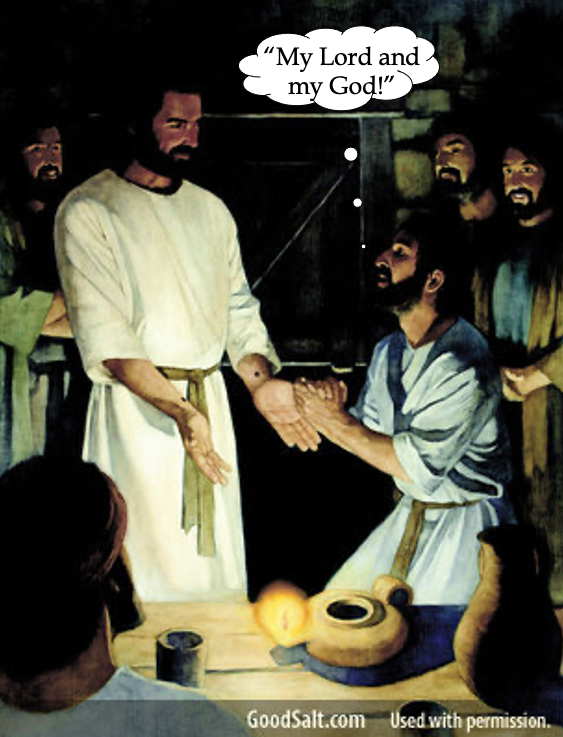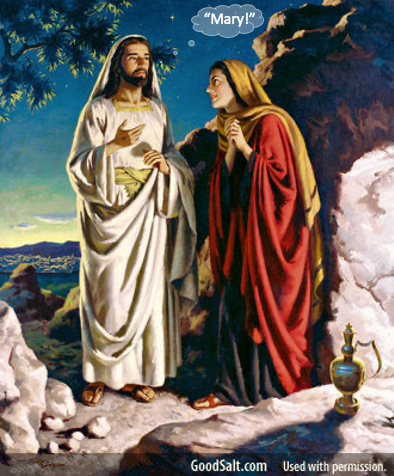“The other disciples therefore said to him, ‘We have seen the Lord.’ So he said to them, ‘Unless I see in His hands the print of the nails, and put my finger into the print of the nails, and put my hand into His side, I WILL NOT BELIEVE.’ ” John 20:25 (Emphasis added)
In John 20:24-29, we are learning how to overcome doubt. So far we have discovered we can overcome doubt when we…
– Restore our fellowship with other Christians (John 20:24).
– Readjust our unrealistic requirements for belief (John 20:25a).
Let’s remember that Thomas was already a believer in Jesus for everlasting life (cf. John 2:11; 11:15 13:10; 14:5) when he struggled with doubts about Jesus’ resurrection. Likewise, as believers in Jesus, we will all have doubts in our lives. There are many different kinds of doubts that we will face. 1
One kind of a doubt is what is called the sudden kind of doubt. You are driving down the highway and all of a sudden this thought jumps into your mind that says, “None of these things about Jesus are real.” Or, “No one is really going to heaven. What if this is all a lie?” Have you ever had those kind of thoughts? Where do those thoughts come from? They come from Satan, the evil one. These kind of thoughts will just pop into your mind. You can just throw them out like trash as quickly as possible. Don’t be concerned about these.
But another kind of doubt is called circumstantial doubts. These doubts come into our lives because of certain circumstances that we face. Doubts that come because of certain relationships or disappointments. These are longer lasting doubts. They come into our lives when circumstances do not turn out like we expected God was going to do.
When these circumstantial doubts take place, we have to decide how we are going to deal with them. How are we going to trust God in this? The way to do this is the same way Thomas needed to do it.
Thomas was not among the disciples the first time Jesus appeared to the ten disciples the day He rose from the dead (John 20:19-23). After Jesus’ appearance to them, the disciples came to Thomas, saying, “We have seen the Lord.” Thomas then said to them, “Unless I see in His hands the print of the nails, and put my finger into the print of the nails, and put my hand into His side, I will not believe.” (John 20:25). The disciples are encouraging Thomas to have faith that Jesus is alive. But Thomas says, “I will not believe.”
Thomas is telling us, “I am choosing not to believe.” He is making a choice not to believe Jesus is alive. It is a matter of his will. Those who deny that faith is a choice are ignoring the truth of the Scriptures. God makes it very clear that faith is a matter of the will.
Jesus amplifies this when He comes to His disciples eight days after His resurrection. “26 Jesus came, the doors being shut, and stood in the midst, and said, ‘Peace to you!’ 27 Then He said to Thomas, ‘Reach your finger here, and look at My hands; and reach your hand here, and put it into My side. Do not be unbelieving, but believing.’ ” (John 20:26-27). Although the doors were locked, Jesus materialized in front of the disciples and said, “Peace to you.” Then Christ turned directly to Thomas, as if He had come for his sole benefit. Knowing full well the struggles going on in Thomas’ heart, Jesus invites him to explore with his hands (“Reach your finger here”) and his eyes (“look at My hands”) the reality of His resurrection body.
When Jesus said, “reach your hand here, and put it into My side,” he was referring to a literal hole in His side that was left by the spear. It had healed over but it left an obvious impression. Jesus did not condemn Thomas for his unbelief. He didn’t say, “You should not ask questions like that Thomas!” Christ gave Thomas undeniable evidence that He rose from the dead to answer his objection and then invites him to believe.
Christ began with Thomas’ objection and then gave him evidence. Peter taught the same thing in principle when he wrote, “But sanctify the Lord God in your hearts, and always be ready to give a defense to everyone who asks you a reason for the hope that is in you, with meekness and fear.” (I Peter 3:15).
When sharing the gospel with an intellectual skeptic, they may say to you, “Where did Cain get his wife?” The answer is he married his sister. But we can go beyond that and show the reasonableness of that answer. Granted, there are some problems with that answer. The first problem is we know that Adam had sons – Cain, Abe, and Seth (Genesis 4:1-2, 25), but we cannot name any of his daughters. Now if Adam did not have any daughters, how could Cain marry his sister? The answer to that difficulty is that Adam did have daughters. Genesis 5:4 says, “After he begot Seth, the days of Adam were eight hundred years; and he had sons and daughters.”
But this brings up a second problem. Today we cannot marry a sister because if a brother marries his sister the mathematical possibilities of the weakness of their genes coming up in their children is great. That is why this is called incest and is forbidden today.
The only way to solve that problem is to have genetically perfect parents. That is exactly the case with Cain and his sister. Adam and Eve were created directly by God so Cain and his sister had perfect heredity. Their children would have had few harmful mutations. When sin entered the world at the fall (Genesis 3; Romans 5:12), it brought with it mutations in the DNA resulting in disease, death, and destruction. The gene pool would gradually become corrupt. At first no harm would result from marrying a brother or sister, but as generations passed harmful genetic mutations along, those harmful mutations and defective genes would increase and accumulate. Eventually, it became too dangerous to marry a close relative because of the increased likelihood of inherited disease. This is why God forbid marrying a close relative in the time of Moses, about 2,500 years after the creation of Adam and Eve (Leviticus 18:6-8).
But there was no prohibition against marrying a close relative in the beginning because there was no need for it. So the point is that there is a reasonable answer to the question, “Where did Cain get his wife?”
Some of us may conclude that we could never witness because we will not be able to come up with all those intellectual answers. But often times, non-Christians do not ask the questions Christians ask. Those of us who are believers in Jesus hear the Bible discussed and explained and we expect non-Christians to ask the same questions we do. But more and more non-Christians in the world are biblical illiterates. They usually don’t ask the questions we do.
Most non-Christians ask very basic questions: What about those who have never heard? Is Christ the only way to God? How can you be sure Jesus is God? Why do the innocent suffer? How can miracles be possible? Isn’t the Bible full of errors? Isn’t the Christian experience psychological? Won’t a good moral life get me to heaven?
Rather than worry about non-Christians asking difficult questions, simply share the gospel with those who will listen. If you do not know the answer to their questions, be honest and tell them you do not know. I find it helps to say to them, “Thanks so much for a great question. I do not have an answer to that right now, but I will do some research and get back to you with an answer.” The internet has many helpful Christian websites that can help you answer tough questions. 2 Ask your pastor for some help if you don’t find any on the internet.
When an intellectual objection is given to you by someone, start out by giving a reasonable answer to the stated objection. Some people do have honest intellectual questions. They want answers. They will usually accept reasonable answers, or at least the reasonableness of an answer.
But when a person objects to Christianity and does not accept the reasonableness of an answer, his or her problem is moral, not intellectual. These people tend to argue rather than listen to the reasonableness of your answers. So pursue the moral issue.
Perhaps they are struggling with guilt. For example, an evangelist was having a rap session with high school teenagers. One girl who sat in the back had been quiet. Near the end of the session, she said, “The Bible says God loves everyone. Then it says God sends people to hell. How can a loving God do that?” The evangelist gave reasonable answers but she kept coming back with arguments. He didn’t convince her nor did she convince him. Soon the session was dismissed.
Afterward, the evangelist approached the girl and said, “I owe you an apology. I really should not have allowed our discussion to become so argumentative.” Then he said, “May I share something with you?” “Yes,” she said. So he began to present the gospel to her. When he got to Romans 3:23, he said, “We are all sinners.” Then she began to cry. She then admitted to having an affair with a married man. The one thing she needed was forgiveness. After the gospel presentation, she trusted Christ alone for the forgiveness of all her sin and received the gift of eternal life. The reason she had not believed in hell was because she was going there. Rather than face her guilt, she denied there was any future hell.
Others we may witness to may struggle with bitterness. Many non-Christians have been turned off by Christians or Christianity. They have had Christianity crammed down their throats or they have been stabbed in the back by a Christian. Their response was bitterness. They have been wounded and they are hurting. They need to hear and see the grace of Jesus Christ.
Another moral issue that can hinder a non-Christian from hearing reasonable answers to their questions is a sinful self-will. After hearing the gospel presentation, one student said, “I can’t answer your presentation, but it is reasonable. It is just that I refuse to accept it.”
This is what kept many religious leaders from believing in Jesus when Christ walked the earth. Christ said to those who refused to believe in Him as the Christ, the Son of God, “39You search the Scriptures, for in them you think you have eternal life; and these are they which testify of Me. 40 But you are not willing to come to Me that you may have life.” (John 5:39-40). These religious leaders devoted their lives to studying the Scriptures “which testify of” Jesus, but they never found Him. Why? Because they were “not willing to come to” Him that they “may have life.” They were unwilling to believe in Jesus even though the Bible testifies of Him from cover to cover.
When witnessing to intellectuals, we must avoid two extremes:
1) Anti-intellectualism which says, “Don’t bother me with intellectual questions. Just let me present the simple gospel.” The result is the thinking non-Christian will conclude that his honest questions have no answers and he won’t listen to the gospel.
2) Intellectualism that says answers will win the person to Christ. So we rely on intellectual answers and not on God. Keep in mind that it was not the disciples who convinced Thomas (John 20:25a), it was Jesus Himself who convinced this skeptic. Giving people the gospel will often do what all the intellectual arguments fail to do – break down the barriers. There is only one way to God – the gospel or good news of Jesus and His death and resurrection. But there are many ways to the gospel. The road may be straight, or it may contain curves. You have to travel the road the person is on when you find him or her. No matter where you find him or how many roads he takes, or how many rest stops he insists on, guide him gently toward the gospel of Jesus Christ. Rely on the Holy Spirit instead of reasonable answers to persuade the person to believe in Christ alone as his or her only hope of heaven.
After Jesus gave Thomas the evidence to answer to his objection, Christ commands him, “Do not be unbelieving, but believing.” 3 It is a matter of the will. It is a choice to stop doubting and to believe.
When Thomas said, “I will not believe” (John 20:25b), in the Greek language he used a double negative. 4 Literally, he is saying, “I will no not believe.” We might translate it, “I will positively not believe.” At least Thomas is being honest. He is making it clear that the reason he will not believe Jesus is alive is because he has made the choice not to believe it. He is choosing not to believe.
Some people think that having faith is a matter of the intellect or logic. Others view faith as being based on emotions. So which is it? Logic or feelings? Neither is true. Faith is volitional. It is not based upon the intellect or feelings. It is based upon the will.
There are people who are waiting for their mind to inform them or their emotions to lead them into the kind of faith in God that they see other people having. It is not going to happen. Yes, information or emotions can influence our decisions. But simply having enough information in our minds or enough emotions in our hearts is not going to automatically give us faith in God. Faith is a matter of the will.
When I choose to believe, then my emotions will follow and my mind will start to understand more and more of Who God truly is. It is a matter of the will.
When Jesus told Thomas, “Do not be unbelieving, but believing” (John 20:27b), He was telling him to choose to stop moving in the direction of unbelief and to decide to start moving in the direction of belief. So the third way to overcome doubts is to REDIRECT OUR WILLS TOWARD BELIEVING (John 20:25b-27). We are either moving in the direction of belief or we are moving in the direction of unbelief. We either decide to accept God’s Word is true or we decide to reject His Word is true. We either decide that God is a Promise-Keeper or God is a Promise-Breaker. We decide that God is either a Truth-Teller or a Liar.
Please understand that Thomas still had eternal life even though he had doubts. When you believe in Jesus for eternal life, you can never lose eternal life. That is why Jesus says you “shall never perish” after you believe in Him (John 10:28a). The word “never” means forever. If you could “perish” in hell after believing in Jesus, then Christ told a lie in John 10:28a. But Christ will not break His promise of eternal life to those who believe in Him because He is “full of truth” (John 1:14) and is “the truth” (John 14:6). He always keeps His promises.
But you may ask, “If I doubt my salvation, does that mean I am not saved?” It is possible. Those who doubt their salvation fall into one of three categories: 5
– You may be a doubter at heart. In other words, some people doubt everything. They doubt whether their mates love them or whether their children respect them. They doubt they will reach the age of retirement, or that their plane will reach its destination. Such people have issues they must deal with that are far different than eternal salvation.
– You may not understand the gospel and are not saved. Perhaps you are trusting in Christ plus your works or just your works alone, instead of trusting in Christ’s finished work on the cross (John 3:15-16; 19:30). Therefore, you don’t have any certainty of going to heaven. Or you may have been taught that if you cannot remember the date you became a Christian, then you are not saved. So you wonder, “Could that mean I’m not saved?” Let me ask you, did Jesus say, “Whoever believes in Him and knows the date they were saved has everlasting life?” No. The real question is, “Whom am I trusting right now to give me eternal life?” Our salvation is established by Whom we place our trust in, not when we trusted Him.
– You have trusted Christ and are saved, but you have confused entering the Christian life (John 3:16; 5:24) with living it (I John 1:4-10; 2:3-6; 3:6-15; 4:20:21). When a believer takes his or her focus off of Christ and His promise of eternal life, he or she may begin to doubt their salvation. When you listen to teaching that confuses entering the Christian life with living it, you are going to have doubts that you are saved.
For example, a few years ago I listened to a famous preacher on the radio in America say that the book of I John was written to provide tests to see if you are saved. He said to ask yourself, “do I have fellowship with the Father?… am I abiding in Him?… do I keep God’s commandments?… do I love other Christians?… am I overcoming sin?” If you couldn’t answer “yes” to all these questions, then he said you cannot be certain you are saved.
But this preacher failed to observe the purpose of I John is not to tell you how to become a Christian or how to know you are a Christian. First John was written to tell us how to have fellowship (closeness) with Christ or how to know you have fellowship with Christ. The author of I John, the same author of the gospel of John, writes, “3 That which we have seen and heard we declare to you, that you also may have fellowship with us; and truly our fellowship is with the Father and with His Son Jesus Christ. 4 And these things we write to you that your joy may be full.” (I John 1:3-4).
The gospel of John tells you how to receive the gift of eternal life, mentioning the word “believe” ninety-nine times. 6 The book of I John tells us how to get close to the One you have believed in, using the word for “abide” (menō) twenty-three times. 7
Therefore, closeness to Christ is discussed in I John, not salvation. People who don’t act like a Christian or a disciple may not be a believer. But to use characteristics of a disciple to determine if you are a Christian is not helpful. Some people might live a good moral life without being a Christian. It could be that those people are trusting in their works instead of Christ’s finished work on the cross to get them to heaven.
Losing your assurance of salvation is not the same as losing your salvation. As we have seen in the gospel of John, when you believe in Christ for eternal life, you are eternally secure at the moment of faith because of Christ’s performance and promise (John 3:14-18; 5:24; 6:35-40, 47; 10:28-29; 11:25-27; 19:30), not your performance or feelings.
However, being certain of your salvation can waver if you start looking to someone or something else other that Christ and His promise of eternal life. If you doubt your salvation, ask yourself: 8
– Do I understand the simplicity of the Gospel? Since Christ paid the full penalty for my sins when He died on the cross and rose from the dead (John 19:30; I Corinthians 15:3-6), God can now forgive me based on what He has done for me, not what I do for Him (Acts 10:43; Ephesians 1:7; Colossians 1:13-14).
– Have I trusted Christ alone for my salvation? We appropriate Christ’s death on the cross by coming to Him as sinners, recognizing that He made the full payment for sin on our behalf, and “believing.” Jesus promised, “He who believes in Me has everlasting life” (John 6:47). The word “believe” means to place our trust in Christ alone as our only basis for living eternally with God. If you are trusting Christ alone to get to heaven, you are forever God’s child regardless of when or where that occurred.
– Am I taking God at His Word? Once you trust in Christ, you must trust His Word. That means accepting God’s promise that, having trusted Christ, we are forever His. Jesus assures us: “And I give them eternal life, and they shall never perish; neither shall anyone snatch them out of My hand.” (John 10:28).
If I were to ask you whose child you are, you would say, “I am the child of …” You have proof that would stand up in a court of law – a birth certificate. A piece of paper assures you that you are their child. God has given us a piece of paper – the inspired Word of God, the Bible. It assures us that once we have believed in Christ, we have everlasting life. We are His forever. If you could lose your salvation, then Jesus just lied to us in John 3:16 when He said, “Whoever believes in Him should not perish but have everlasting life.” Our salvation is based upon a promise that cannot be broken. It comes from a God who cannot lie.
In closing, Jesus looked at Thomas and said, “Do not be unbelieving, but believing” (John 20:27b). This meant it was a matter of Thomas’ will. This was something he could choose. And Thomas did. His decision teaches us our next way to overcome doubt. But that is for our next time together.
Prayer: Precious Lord Jesus, thank You for showing me that it is my decision to move toward doubting or believing. I cannot blame my doubts on my circumstances, my past, my parents, my personality, or my peers. I am responsible for whether or not I choose to doubt or believe. Simply having more information in my mind or more emotion in my heart is not going to automatically give me faith in You. It is a matter of my will. This day I am deciding to move in the direction of believing, not doubting. Whether I feel like believing or not, I will choose to move toward believing. Whether I have more or less information, I will decide to move toward believing. When I doubt my salvation, I will refocus upon You and Your unchanging promises. Please help those who doubt Your resurrection to realize it is their choice to do this. Just as You gave Thomas evidence to answer his objection, please give others what they need to come to faith in You. They can choose to believe or not believe. The choice is theirs. But that choice has eternal consequences. In Your name I pray, my Lord and my God. Amen.
ENDNOTES:
1. Adapted from Tom Holladay’s August 28, 1996 sermon entitled, “How to Have Faith.”
2. See www.answersingenesis.org ; www.josh.org ; www.probe.org ; www.carm.org ; www.christiananswers.net .
3. The verb (ginou) in the phrase, “do not be unbelieving” (mē ginou apistos) is a present imperative.
4. Ou mē pisteusō.
5. Adapted from R. Larry Moyer, 21 Things God Never Said: Correcting Our Misconceptions About Evangelism (Grand Rapids: Kregel Publications, 2004) pp. 79-81.
6. In the Greek Majority Text John uses the word for “believe” (pisteuō) ninety-nine times: John 1:7, 12, 50; 2:11, 22, 23; 3:12(2), 15, 16, 18(3), 36; 4:21, 39, 41, 42, 48, 50, 53; 5:24, 38, 44, 46(2), 47(2); 6:29, 30, 35, 36, 40, 47, 64(2), 69; 7:5, 31, 38, 39, 48; 8:24, 30, 31, 45, 46; 9:18, 35, 36, 38; 10:25, 26, 37, 38(3), 42; 11:15, 25, 26(2), 27, 40, 42, 45, 48; 12:11, 36, 37, 38, 39, 42, 44(2), 46, 47; 13:19; 14:1(2), 10, 11(2), 12, 29; 16:9, 27, 30, 31; 17:8, 20, 21; 19:35; 20:8, 25, 29(2), 31(2).
7. In the Greek Majority Text, John uses the word for “abide” (menō) twenty-three times: I John 2:6, 10, 14, 17, 24(3), 27(2), 28; 3:6, 9, 14, 15, 17, 24(2); 4:12, 13, 15, 16 (3).
8. Moyer, 21 Things God Never Said, pp. 81-83.






